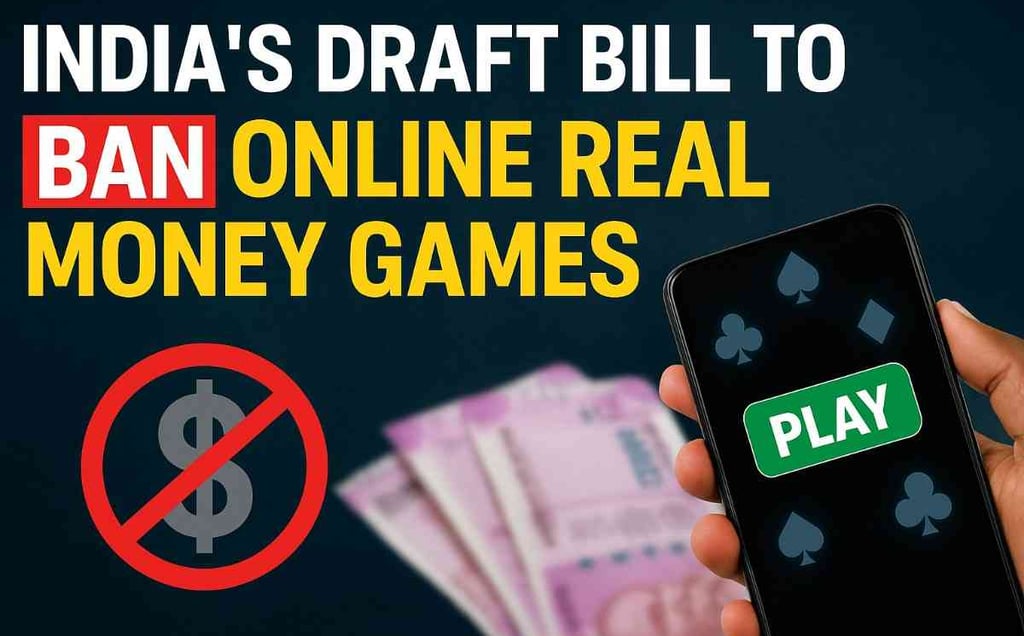India’s Draft Bill to Ban Online Real Money Games: Here’s What It Means
India’s booming online gaming industry may be heading for a dramatic shift. The government has drafted the Promotion and Regulation of Online Gaming Bill, 2025, which proposes a complete ban on real money gaming platforms across the country.
TRENDINGTECH
Neurotainment
8/19/20252 min read


This move, if passed into law, will reshape one of India’s fastest-growing digital industries—raising questions about jobs, innovation, and the balance between entertainment and safety
What Exactly Are Online Real Money Games?
Online real money games are platforms where players deposit actual money to participate in games, with the chance of winning cash prizes or rewards. These include:
Fantasy sports apps
Card games like rummy and poker
Skill-based and chance-based betting games
While these platforms have created entertainment and even career opportunities, they’ve also sparked serious concerns around addiction, fraud, and illegal betting activities.
Key Highlights of the Draft Bill
1. Blanket Ban on Money-Based Games
The bill would outlaw:
Any online game involving monetary deposits or wagers.
Promotions or advertisements of such games.
Banks, wallets, or payment services from processing transactions for these platforms.
2. Strict Penalties for Violations
Those who continue offering or promoting real money games could face:
Up to 3 years in prison
Fines of up to ₹1 crore (approx. $120,000)
Penalties for companies, influencers, and payment processors who support these platforms.
3. Focus on Consumer Protection
The draft law aims to shield citizens from:
Financial exploitation
Addiction-related mental health issues
Fraudulent or unregulated platforms
Why Is the Government Cracking Down?
Several factors have fueled this strong response:
Money Laundering & Fraud: Allegations that gaming platforms enable illegal money transfers.
Youth Addiction: Rising cases of young users trapped in debt cycles and stress.
Lack of Regulation: No robust oversight to ensure fairness or accountability.
Financial Risks: Reports of users losing life savings, leading to personal and family crises.
National Security: Concerns over offshore companies targeting Indian players.
Industry & Public Reaction
The online gaming industry in India is worth billions and employs thousands. Many industry leaders have voiced concerns that a blanket ban could push users toward unregulated, foreign platforms, which may be even riskier.
Instead, gaming associations argue for strong licensing and regulation frameworks rather than an outright prohibition.
What Happens Next?
The bill has already been cleared by the Cabinet and will soon be tabled in Parliament.
If passed, India will become one of the few countries with a nationwide ban on real money gaming.
The government also plans to set up a dedicated online gaming regulator to oversee safe, legal, and skill-based gaming options.
The Road Ahead: Safe Alternatives
While the bill may shut down money-based platforms, it encourages:
Skill-focused, non-monetary games
Licensed gaming platforms with strong safeguards
Balanced regulation that protects both users and innovation
Conclusion
India’s proposed ban on online real money games reflects a tough stance against gambling addiction and illegal betting practices, but it also raises important questions about jobs, consumer choice, and innovation.
As lawmakers debate the bill, its impact on players, gaming companies, and the broader digital economy will be closely watched—not just in India, but by the global gaming community.
